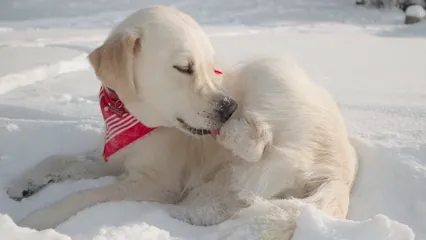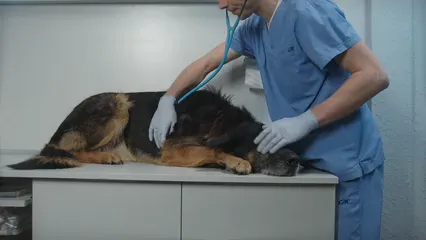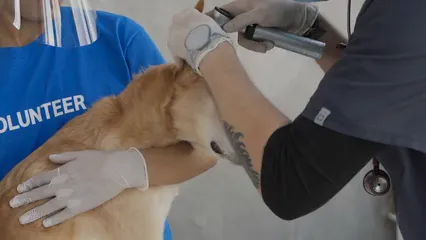
Why Do Dogs Lick Their Paws at Night?
Introduction
Have you ever wondered why your dog licks their paws at night? This behavior is quite common among our furry friends. While some licking is normal, excessive paw licking can signal underlying health issues. Understanding this behavior is essential for your dog’s overall well-being. Let’s dive into what might be causing your pup’s nighttime paw licking.
Before we jump into the details, let’s ensure your dog’s paws are well cared for. A Dog Paw Balm can soothe and protect those precious paws from irritation, especially during dry seasons. Trust me, your pup will thank you!

Summary and Overview
Dogs lick their paws for various reasons. Sometimes, it’s just part of their grooming routine. However, other times it can indicate health concerns that need attention. Monitoring this behavior is important. If you notice excessive licking, it may be time to consult your veterinarian.
Several factors can contribute to nighttime paw licking. This article will explore common causes, from allergies to anxiety, and offer insights on how to support your dog. Remember, knowledge is key to keeping your furry friend happy and healthy!

Understanding Normal vs. Excessive Licking
Definition of Normal Licking
Dogs lick their paws for various reasons, and some licking is completely normal. Regular paw licking often serves as a grooming method. After a fun romp outside or a long walk, your furry friend might lick their paws to clean off dirt and debris. They may also lick their paws to feel more comfortable, especially after a busy day of play. This behavior can be soothing and is a natural part of their routine.
Licking can also help them cool down. On warm days, they might lick their paws to release moisture and regulate their body temperature. So, if you catch your dog licking their paws after an adventure, it’s usually nothing to worry about.

Recognizing Excessive Licking
However, how can you tell when licking becomes excessive? Generally, excessive paw licking happens when it lasts for long periods or occurs multiple times throughout the night. If your dog licks their paws for several minutes or even hours, it may indicate a problem.
Excessive licking can lead to skin irritation and infections. When a dog licks too much, it can cause red, inflamed skin. In severe cases, it may lead to sores or even bleeding. If you notice your dog obsessively licking their paws, it’s time to investigate the cause. Consider consulting a veterinarian to ensure your pup stays healthy and comfortable.

Why Do Dogs Lick Their Paws at Night? Common Causes
Allergies
Allergies are a significant reason behind nighttime paw licking. Dogs can be allergic to various substances, such as certain foods, pollen, or chemicals found in cleaning products. Environmental allergens can trigger reactions, especially when your dog is outside.
When faced with allergens, your dog might lick their paws to soothe the irritation. Look for symptoms like redness, swelling, or scratching. If you notice these signs, it’s essential to identify the allergen. According to recent statistics, around 10% of dogs suffer from allergies, making it a common issue for pet owners.

Recognizing the signs of allergies early can help you take appropriate steps to relieve your dog’s discomfort. If you suspect allergies, consulting with your veterinarian can lead to effective solutions. They may recommend allergy testing or suggest dietary changes to help your pup feel better. Consider supplementing your dog’s diet with Omega-3 Fish Oil Supplements for Dogs to help boost their skin health!
Understanding why dogs lick their paws can help you address potential issues effectively. Why do dogs lick their paws is a great resource for dog owners looking to understand this behavior better.
Anxiety and Stress
Dogs can experience anxiety just like humans. This stress often shows up at night. When things quiet down, your dog might feel more anxious. Common triggers include separation anxiety or loud noises. Imagine your dog hearing fireworks while you’re trying to relax. This can lead to nervous licking of their paws.
Paw licking serves as a self-soothing mechanism. It can help them feel more secure during stressful moments. If you notice your dog licking their paws frequently at night, consider their environment. Are there loud noises or changes that might disturb their peace? Understanding these stressors is key to helping your furry friend calm down.

Pain or Discomfort
Paw licking can also indicate pain or discomfort. If your dog has an injury or a condition like arthritis, they may lick their paws to find relief. Sometimes, this behavior happens more at night when they’re resting. Look for signs like limping or visible swelling. If your dog seems sensitive when you touch their paws, that’s a red flag.
It’s essential to check for injuries. Look between their toes and pads for cuts, splinters, or other irritants. Keeping an eye on these signs can help you catch potential issues early. If you suspect pain, consulting your veterinarian can help identify the underlying cause and provide relief. A Dog Nail Clippers can help you keep their nails trimmed and prevent injuries!

Parasites
Parasites are another reason dogs lick their paws. Fleas, ticks, and mites can cause irritation and itching. When your dog feels uncomfortable, they may start licking to alleviate that itch. Regularly check your dog for visible signs of parasites. Look for scratching or hair loss in specific areas.
Preventive measures can protect your dog from these pesky critters. Use vet-recommended flea and tick treatments. Regular grooming can also help spot potential issues early. Keeping your dog free from parasites is crucial for their comfort and overall health. Don’t forget to have a Pet First Aid Kit handy for emergencies!

Boredom
Boredom can lead to excessive paw licking too. Dogs need mental and physical stimulation. If they lack activities, they might turn to licking as a way to pass the time. Think of it like fidgeting for dogs! Engaging your pup with toys and activities can reduce this behavior.
Consider incorporating daily walks, playtime, or puzzle toys into their routine. Training sessions can also provide mental stimulation. Keeping your dog entertained helps prevent boredom-related behaviors, including that late-night paw licking. A well-stimulated dog is a happy dog! Try using Interactive Dog Toys to keep their minds sharp!

Dry Skin and Irritants
Dry skin often affects dogs, especially as seasons change. Environmental factors like cold weather and low humidity can worsen this condition. When your dog’s skin becomes dry, they may lick their paws to alleviate the discomfort. It’s their way of trying to soothe the itchy sensation.
Common irritants can also play a role in this behavior. Chemicals from cleaning products or harsh surfaces can cause irritation. If your pup walks on rough terrain or hot pavements, their paws can become sore. This discomfort may lead them to lick their paws frequently, seeking relief from the irritation. A soothing Dog Shampoo for Sensitive Skin can help keep their skin and coat healthy!

When to Consult Your Veterinarian
Signs That Require Professional Attention
If your dog’s paw-licking becomes persistent, it’s time to take notice. Look for specific signs that indicate a need for veterinary consultation. These signs include ongoing licking that lasts for several minutes or more, visible lesions, or redness between the toes. If you notice your dog limping or showing signs of discomfort, don’t hesitate to reach out to your vet.
During a veterinary visit, you can expect a thorough examination. The vet will ask about your dog’s behavior and any changes you’ve observed. They may recommend diagnostic tests, such as skin scrapes or allergy tests, to pinpoint the issue. Understanding the root cause is crucial for effective treatment.

Treating Nighttime Paw-Licking
Addressing Underlying Causes
To treat nighttime paw-licking, first identify the underlying causes. If allergies are the culprit, your vet might suggest allergy management techniques. This could include dietary changes or medications to reduce symptoms. Behavioral therapy may help if anxiety or stress is the issue. Techniques such as gradual desensitization can aid in managing anxiety.
For dry skin, consider incorporating omega-3 fatty acids into your dog’s diet. These can help improve skin health and reduce irritation. Moisturizing shampoos can also soothe dry paws. Always consult your veterinarian before starting any new treatment to ensure it’s appropriate for your dog’s specific needs.

Home Remedies and Temporary Solutions
If your dog is licking their paws, there are some safe home remedies you can try. One effective method is a paw soak. Simply fill a shallow bowl with warm water and add a bit of Epsom Salt. Soak your dog’s paws for about 5-10 minutes. This can help soothe irritation and remove allergens.
Another option is to use moisturizers specifically designed for dogs. These can hydrate dry skin and provide relief. Look for natural ingredients that are safe for pets. A good paw balm can also protect your dog’s paws from further irritation.
However, if your dog’s licking persists, it’s crucial to consult your veterinarian. Persistent licking can indicate underlying health issues that require professional attention. A vet can help identify the cause and suggest appropriate treatments.

Preventing Nighttime Paw-Licking
Maintenance and Grooming
Regular grooming is essential for your dog’s overall health. Keeping your dog’s paws clean and well-trimmed can prevent issues that lead to licking. Use a damp cloth or Dog Grooming Wipes to clean their paws after walks. This removes dirt and allergens that may irritate their skin.
Consider investing in quality grooming tools. A good pair of Dog Scissors for Grooming and a brush can keep your dog’s skin and fur healthy. Regular grooming can also help you spot any potential problems early, such as cuts or infections.

Mental and Physical Stimulation
Dogs need mental and physical stimulation to stay happy and engaged. A bored dog might resort to licking their paws out of frustration. Incorporate daily exercise into your dog’s routine. Long walks, fetch games, or agility training can help keep their minds sharp and bodies fit.
Interactive toys, puzzle feeders, and training sessions can also provide mental stimulation. Try rotating toys to keep things fresh and exciting. Engaging your pup in various activities can reduce boredom and help prevent excessive licking. A Puzzle Feeder for Dogs can keep them entertained and mentally stimulated!

Creating a Comfortable Environment
A cozy sleeping area can make a big difference in your dog’s comfort. Ensure your dog has a soft, clean Cozy Dog Bed in a quiet space. Familiar scents can create a calming atmosphere. Consider using a blanket or a piece of your clothing to provide comfort.
You might also try calming sprays or diffusers designed for pets. These can help create a peaceful environment, especially during stressful times like thunderstorms. A comfortable and relaxing space can ease anxiety, reducing nighttime paw licking. A Dog Calming Diffuser can help keep your pup relaxed!
Conclusion
In summary, understanding why your dog licks their paws at night is vital for their health. Regular grooming, mental stimulation, and a comfortable environment are key strategies. If you notice excessive licking, monitoring your pet’s behavior is essential. Don’t hesitate to consult your veterinarian if the licking continues. Addressing these behaviors can lead to a happier, healthier dog.
Please let us know what you think about our content by leaving a comment down below!
Thank you for reading till here 🙂
All images from Pexels




